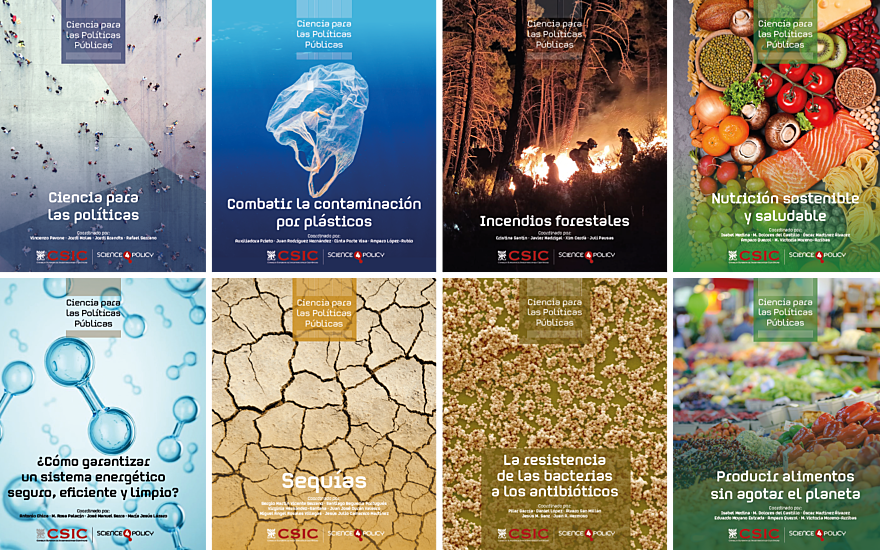
CSIC’s Science Policy Report Collection
Aiming to work as a link between scientist and policy makers, the latest CSIC’s report collection takes in the main scientific and social challenges of this time. Immerse yourself in the biggest challenges of today: droughts, malnutrition, and multi-resistance bacteria.
CSIC and its Science Policy report collection
The Spanish National Research Council (CSIC) is the largest Spanish public research institution and the main agent to promote scientific and technological development in Spain.
Besides research being its main source of work, one of the main missions of CSIC relies on informing and advising the public and private sector on the scientific and technological innovation findings; which bring us to CSIC’s new reports collection named Science for Policy (Ciencia para las Políticas Públicas).
A group of researchers has gathered the most important scientific and social challenges in a series of reports that will serve as a bridge between research centers and policy makers. Here we will talk about 3 of the most relevant challenges found in the reports: droughts, malnutrition, and bacteria resistance to antibiotics.

Droughts, an anomalous sitiation establishing in our lands
Drought is commonly mistaken by dry seasons, aridity, or water scarcity; however, drought is a deficit in water availability that negatively affects crop performance, ecosystem services, and, consequently, society.
Nowadays, droughts are one of the most critical natural hazards affecting our planet. In fact, over 55 million people are facing its consequences every year. The issue have caused up to 650.000 casualties between 2010 and 2019, and have already affected developed countries economically, with a loss of nearly 9 billion euros in EU and 6.9 billion dollars in the USA.
Given the influence that climate change is having in our surroundings, it doesn’t come as a surprise to see these numbers rising. As a result of higher temperatures, crop production and productivity is decreasing, while food prices are going up. As well, water is losing quality due to the amount of elements dissolved in it, such as Nitrogen and Phosphorous, which are threatening human health and agricultural consumption.
In CSIC’s words, to mitigate the risk and become more drought resilient, it is fundamental to understand the patterns, identify potential impacts, and put into work efficient mitigation strategies. To do so, governments must ensure proactive measures in order to evaluate and monitor risks, and prepare for early warning systems.
Find out more about droughts and how to face them in the full report “Sequías”, available in Spanish.

Malnutrition, undernourishment and how they affect human health
Malnutrition implies a deficit, excess, or imbalance in the caloric intake of nutrients, whereas undernourishment is a lack of the amount of food and nutrients that a person needs. Truth is, they are the cause of many deaths across the globe; they even produce an annual cost of 3.5 billion euros.
Latest researches have demonstrated that food components and nutrients have a lot to do with human health. Indeed, healthy diets play a fundamental role in preventing cardiovascular and respiratory diseases, as well as cancer, obesity, and diabetes.
Experts have determined that science and public policies must commit to food security by promoting a more sustainable and healthy food system and improving access and affordability to quality foods.
Meanwhile, CSIC will continue studying the relationship between food and risk factors associated with chronic diseases, among other matters like:
- The metabolism, the bioavailability and bio-accessibility of different food nutrients
- Personalized nutrition
- The sourcing and development of new food and ingredients
- The traceability across the food value chain.
Continue learning about malnutrition and undernourishment by reading the full report “Nutrición sostenible y saludable”, available in Spanish

The silent pandemic, a growing bacterial resistance to antibiotics.
Antibiotics have been one of the most important discoveries of all times. Over the years, many lives have been saved thanks to antibiotics function to combating diseases. However, in past times, there has been a significant growth of multi-resistant bacteria, which means they have become stronger to antibiotics effects, following an increase of deathly infections. Currently, this issue has become the biggest threat to global health and food security.
As a matter of fact, antibiotics-resistant infections are killing 1.2 million people every year, and considering the growing tendency, those numbers could increase tenfold in 2025. But deaths are not the only negative effect, indeed, this rising issue could bring 2 to 6 billion euros of global economic loss per year.
Scientific studies have concluded that humans, animals, and the environment are interconnected in a way that illnesses, such as antimicrobial-resistance, can be transferred between them. Besides, it is now known that globalization and climate change have directly affected the growth and expansion of antibiotic-resistant bacteria. Hence, scientist ask governments to take a more holistic and innovative approach to face the topic and create international antibiotics.
Focusing on the problem, CSIC is working on a wide portfolio, which covers some of the following research lines:
- Understanding the different resistance mechanisms of bacteria.
- Developing therapies using bacteriophages
- Working on nanomedicine and environmental health to improve antibiotics
Check out the full report “La Resistencia de las bacterias a los antibióticos” to understand the consequences of the multi-resistant bacteria and learn about the latest mechanism to fight them back.
More News from EIT Food South









